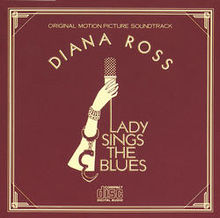The 1972 Smackdown is coming soon! Here's Chris on that year's Oscar nominated biopic on Billie Holliday...
 We complain a lot about stodgy biopics in the “greatest hits” mold, simply relying on the known Wikipedia fenceposts to construct its narrative. Lady Sings The Blues is kind of the poster child for such frustrations - I mean, the original poster literally proclaimed “Diana Ross IS Billie Holiday”.
We complain a lot about stodgy biopics in the “greatest hits” mold, simply relying on the known Wikipedia fenceposts to construct its narrative. Lady Sings The Blues is kind of the poster child for such frustrations - I mean, the original poster literally proclaimed “Diana Ross IS Billie Holiday”.
What we were given is a film mostly bored by subject and performer, or at least unable to capture what made Ross and Holliday such captivating performers. Blues meanders through the singer’s life story, halting for her performances with fly-on-the-wall passivity that’s as indifferent to the magnetism of the music as it is to Ross’ take...
And here is where the film fails most spectacularly: despite its obvious assets, its musical interest and ambition is perfunctory at best.
Ross doesn’t particularly look or sound like Lady Day, and that isn’t even a problem. Aside from the musical performances, Ross is alive and unflashy as she submits to the ghost of the singer and her demons. She alters her cadence to chase Holliday’s vocal distinctness, not landing on mimicry but arriving at something fragile and immersive that’s a far cry from the ebullient optimism of her own musical persona. Hers is a tough Oscar nomination to argue with, even if the film can’t distinguish her star charisma or that of the legend she portrays.
Is this the unfortunate side effect of one music legend playing another? Perhaps, and maybe because we’re talking about two largely different musical styles to distinguish their differences. But rest assured Ross works harder to find Billie (and on her own terms) than the film does. The thing about capturing a star on screen, whether your performer or central character: you still have to present them as one.
By having limited musical insight and a frustrating ho-hum inertia, Blues finds performer and subject strangely at odds given Ross’ consuming take. The film’s musicality is essentially reduced to “Diana Ross sings the Billie Holliday songbook”, selling both performers aggravatingly short. It’s a soundtrack made up entirely of standards that defaults to genericness that goes against the degree of personality Holliday brought to the medium. Much in the way it lacks ideas about how to make a biopic interesting, the film doesn’t know how musicals work. Never inviting us into its sway or capturing the mood or unique temperature that made Billie Holliday so special, the film allows its music to lay dead on the screen.
Its paint-by-numbers approach makes for a final moment that looks all too familiar when our singer takes the stage of Carnegie Hall for “My Man”. Captured immaculately in the frame, this sequence looks a whole lot like the close of Funny Girl. Whether this is merely another bland adherence to fact in regards to her Carnegie Hall setlist, the visual similarities begs a more original presentation worthy of everything that Ross is giving. While the classic belongs as much to Billie Holliday as it did to Fanny Brice, to borrow the visual identity of another biopic only further highlights how sparsely cued into Holliday that Blues is. It’s lazy musicaling and lazier biopicking saved only by Ross’ stellar performance.
All Soundtracking installments can be found here!